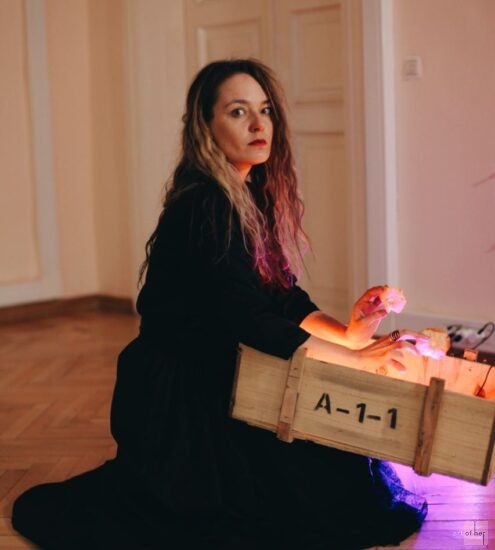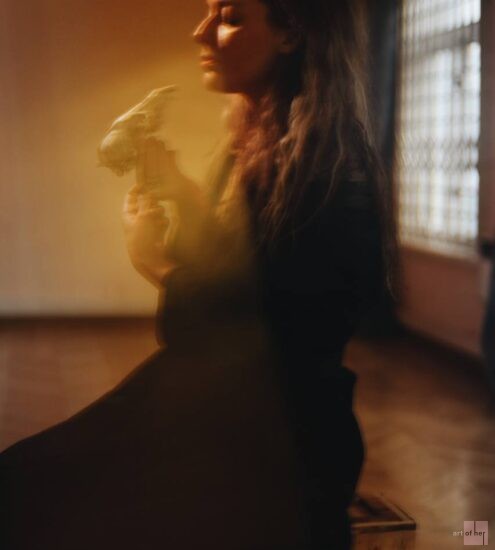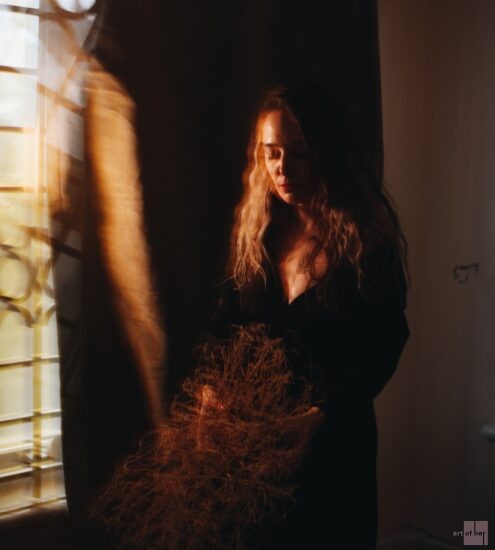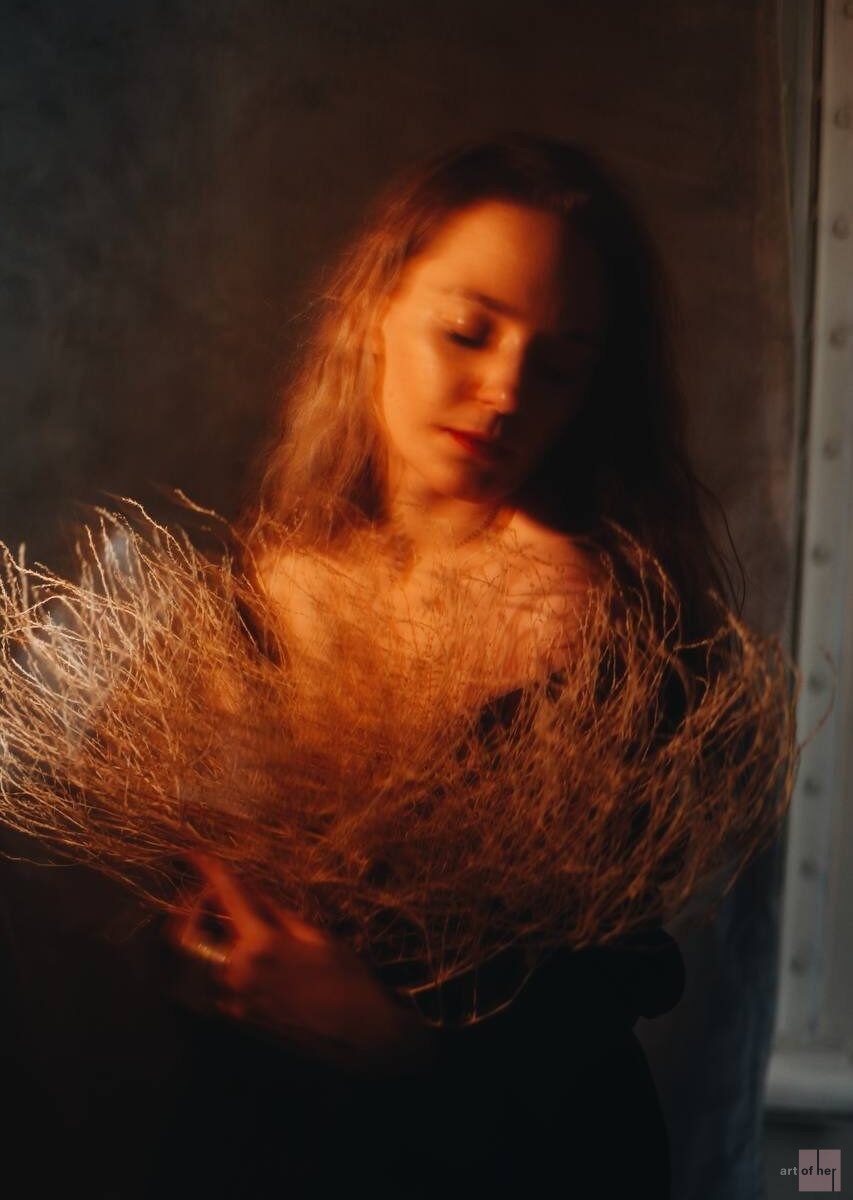Immerse yourself in the silence of your inner world when you find yourself in front of a stranger (yourself) in order to reveal a hidden personality and find a fine line between yourself and her, as well as other viewers of the production.
Корреспондент Art of Her отправился на поиск ответов в новом иммерсивном перформансе Дарьи Спиваковой «Пóтлач тишины».
Оказавшись перед собой, что бы вы сказали себе?
"Potlatch of Silence" is a mockumentary meditation, the practice of shared silence, in which your personal is accompanied by the personal of another viewer. Interestingly, two completely different people do not interfere with each other in studying themselves, but on the contrary are connected in search of solitude.
The genre of "mockumentary" itself assumes pseudo-documentalism, but with such precise research that it is sometimes impossible to distinguish reality from a fictional space. The very idea of the "Potlatch of Silence" fits seamlessly into the venue of its holding – the house of merchant Shakhvorostov (99 Nazarbayev Street), where the consulates of the USA and France were located at different times. It was the latter who played an important role in the production of Daria Spivakova. According to the author's idea, boxes with artifacts of non-human agents and instructions for the practice of shared presence were found in the house.
"This is about a unique sensory experience, about the value of human contact, about the boundless ecosystem of nature and all living beings, about understanding the global social context. A lot of things. About reflecting what is important right now for you. And perhaps the one who is opposite," says Daria Spivakova about the production.
Interestingly, there are no actors involved in the production, except for the conductor who meets and accompanies the audience. During the practice process, the audience is accompanied by a voice that is perceived as the "inner voice" of each of the participants.
The practice of shared presence

The main action of the play takes place in the annex of the house on Nazarbayev Street, 99, where at one time Almaty residents received visas to France. On one side of the mirrored glass is you, on the other – another participant of the performance. But during the practice of shared presence, this glass changes its original meaning and becomes a metaphor.
"Physical mirror glass at some point becomes a canvas, a mirror, a reflection, a window, a screen, a portal, a painting, an iron curtain, a surface of water... it turned out to be a very capacious and timely image, absorbing reflection on our relations with ourselves, each other, virtuality, state structures, about the covid period, about the current geo-political situation. On the other side of the mirror glass is a quote from the poem "First Dates" by Arseny Tarkovsky, this is a line from a song by Boris Grebenshchikov. I feel in these texts a special magic and a special thrill of contact with reality through these lines. It's as if the signs of our time and dreams of returning to the beautiful are so clearly reflected in them again," -Daria Spivakova said.
"Potlatch of silence"

Potlatch - is a traditional ceremony of demonstrative exchange of gifts among the Indians of North America. In the production, the objects of the potlatch are leaves, herbarium, stones, herbs – all this is a reference to the primordial, to human nature. It was the potlatch ceremony that Daria Spivakova chose to establish contact and unite the participants of the practice into a single organism.
All this action is adjusted by internal silence, which, despite the soundtrack, has a strong effect on all viewers.
"I know that the ability to hear silence - is the adjustment of cognitive functions. That silence is always with me, inside, you just need to adjust your brain to arrive in it. I am like the whole being with an imperfect psyche, and sometimes it works, sometimes it doesn't. And there are so many wonderful things in the world that facilitate this attunement. I love dating nature — walking with mountains and the sea, the beauty of simple things, a slow contemplative lifestyle, meditation, books and music. My professional activity — the practice of a psychotherapist — is also a way of exploring methods to hear silence, to be its sensitive guide. And I see this as one of the key functions of an art therapist - through the practice of movement and drawing, to organize the environment and situations that make meetings with silence possible, which allows her to manifest a therapeutic resource," emphasizes the author Daria Spivakova.
Correspondent's answers

The "Potlatch of Silence" session is attended by 10 viewers, in whose life these 55 minutes become an important stage of immersion in themselves and the stranger behind the glass. This is a rethinking of values and the emphasized importance of hearing and being heard in complete silence.
For the correspondent of Art of Her, immersive performances occupy a special place in the study of art, and the "Potlatch of Silence" was the impetus for intimate discoveries of the inner subconscious, which will remain behind the mirrored glass of its own stranger.
But is the local viewer ready for such experiments? Daria Spivakova believes that it is necessary to interact with the viewer, from the position that he is most likely smarter than the author.
"My teachers have always told me to treat the viewer-reader as an intelligent, conscious person, to interact from the position that he is most likely smarter than me. I think it's not a matter of some level of cultural training, but a non-random chance — how much the state of the Potlatch of Silence coincides with the state of the one who comes to it.
It's like a relationship with the weather or with the elements, for example, spring rain — it's not bad and not good in itself, but sometimes someone meeting with it can cause joy and delight, and sometimes he or someone else has negative feelings of untimeness and inappropriateness.
After the screenings of my previous project "Utopia", I received many touching letters about how it turned out to be significant and healing for the audience. I never expected to engage in popular art and was surprised by the number of people who responded to this story.
Also, in my works I leave a lot of layers for immersion, a lot of references, and depending on which layer and how many of them the viewer tries, how he feels and what happens in his own life, his unique experience of impressions will develop.
And the viewer can only taste the cherries from the top of the cake or see through the composition of all the cakes and layers — he will have a different sense of taste.
He may find himself in a sensitively-delicate state and a set of tactile contacts will open up an additional part of the story for him. Someone may turn out to have a pop-cultural and philosophical background similar to mine, and decoded hyperlinks left in sounding texts will lead him into a new space of meanings and semiotic connections.
But if a person is in some other actual state, the work does not lose from this - it's just that a different range of possible impressions is created for everyone," Daria Spivakova noted.
Daria Spivakova is an artist, director, composer, silence technologist and art therapist. The creator of the performances "Utopia" and "Utopia. Return to sleep."
The next session of the "Potlatch of Silence" is scheduled from May 12 to May 15, the number of seats is limited. The editorial board of Art of Her recommends.


Modern women dress not for men, but for themselves: fashion designer Adilya Botabayeva reflects on fashion
Film director David Cronenberg Sells His Removed Kidney Stones As NFT